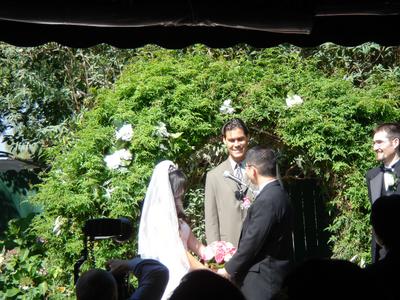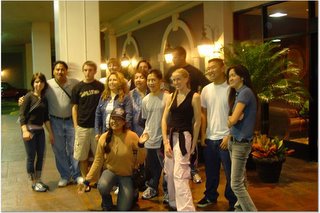This post continues my discussion with Kip by elaborating my perspective on the existence of an absolute morality.
There was a time when I believed in a sense of absolute right and wrong, but since then I have come to change my position on this. The following are some of the logical steps I went through while contemplating this concept. I will begin with the initial premise of C.S. Lewis, which I subscribed to first.
The Premise
Lewis reasoned that since most people accept that some religions are "better" than others, then there must exist some sort of ultimate "best" religion that these comparisons are in a sense "pointing" to. This made sense to me, as did his subsequent claim that Christianity was the religion that best fit the bill, based on other reasoning which I won't get into. In fact Lewis used this universal sense of morality as evidence of God.
Perspective on Good and Evil
Later I came upon a new approach to the concept of evil. Instead of a looking at good and evil as two equivalently manifest ends of the morality spectrum, doesn't it make more sense to define "evil" with respect to good, that is, as the absence of good? This is comparable to how darkness is not a true physical entity, but merely an abstract concept describing the absence of light. I contemplated whether the devil exists, a debate common in Catholic and even Jewish theological circles.
Judgment, and its By-Product, Guilt
The psychological perspective brought me to the point that really made the difference. In reading How People Grow I started to see how judgment and guilt do not benefit a person in that they do not elicit a sustained change in behavior. They may work in the short-term, but in the bigger picture they inevitably do more harm than good. This truth struck with a real resonance because evidence of it was all around me, and even included me, as I had been deeply involved in a group that used both judgment and guilt (unconsciously, in my opinion) as instrumental parts of its practice.
Instead, the more powerful concept that elicits lasting behavior modification is the realization of consequences. When a person realizes how his behavior causes pain to those around him, he wants to change. This presents a more meaningful and effective motivation for change than "because it's the right thing to do."
In their book Cloud and Townsend still believe in the concept of judgment but assert that it is reserved for God alone — it is not meant to be wielded among mortals. I started to wonder though, what might happen if I did not assume God existed in the first place.
The Thought Experiment
The following thought experiment further convinced me — consider the scenario of a man alone on a desert island. In this context, is this man subject to judgment of right and wrong? What kind of universal law could you try to enforce upon him? This implies that law is a purely relational artifact; it only has meaning in the context of two (or more) entities.
Thus the existence of absolute morality and the existence of God are equivalent assumptions. Therefore, one cannot use one to prove the other without creating a circular argument. Of course if they are equivalent, then proving that absolute morality does not exist is as impossible as proving God does not exist.
Although disproving the existence of absolute morality is impossible theoretically, I believe that there is another reason to abandon the idea of it entirely.
Absolute Morality Unattainable
In practical terms, one could never profess having a grasp of absolute morality anyway. Even if there were a source of revelation such as the bible which contained some definition of it, it would still require interpretation by humans in order to understand it, which is by definition fallible. We need only look at the history of Christianity, or any other religion for that matter, to see several tragic early approximations of a purported absolute truth. The real danger is in assuming that we are more "sincere" in our faith than the early believers and therefore beyond making the same errors of interpretation.
Belief in Absolute Morality Dangerous?
Another interesting thing to think about is whether a belief in an absolute morality is actually detrimental, aside from the actual veracity of the claim. I assert that even if such a thing exists, believing that it exists will inevitably entice someone at some point into thinking that he has attained it. If (or perhaps, when) a better perspective comes along, convincing this person that an improvement exists could prove difficult, perhaps even impossible.
Even from the theological point of view, it seems like the "pride before the fall" scenario all over again. In other words, humility would dictate that we leave ourselves open to the possibility that we could be wrong in any particular area.
But perhaps in practical terms there is no difference in saying "there is an absolute truth, but I will never attain it," versus "there is no absolute truth, but I will strive endlessly to find what is better." Either way the point of real consequence is that we should never feel as if we have reached the absolute best policy on how to behave in any situation.
Apologies that this post ran so long; hopefully it's not too incoherent. I did not even delve into moral relativism, which, without having studied it extensively, I imagine I subscribe to. My guess is that The God Delusion, which I have just started reading, will express some of these same ideas more cogently.














































